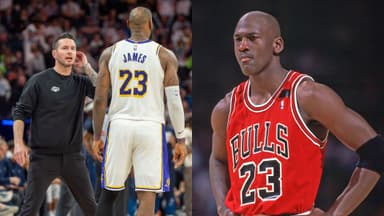When Michael Jordan left the Bulls to go play professional baseball in 1994, it left a hole in the hearts of Chicagoans everywhere. Sure, His Airness would return a couple of years later, but losing the best player in the league certainly wasn’t what the dynasty, nor the league, wanted. That is, unless your name is Steve Kerr.
Advertisement
Kerr was in his fifth year with the Bulls in the 1993-1994 season, the first after Jordan left. The absence of the GOAT gave the then 27-year-old star much more playing time.
It’s also when his game really took a step forward. It’s when he officially morphed into a 3-point role specialist, a role that the squad needed. That year, he averaged 8.6 PPG, the highest of his career.
This isn’t just speculation. The man himself admitted that Jordan’s departure helped extend his career during a recent interview on the Glue Guys podcast. “It actually was to my benefit in some ways that he went because it opened up a bunch of playing time,” revealed Kerr. “It was bad for the rest of the Bulls and their fanbase, but it was good for me. It’s kind of where I reestablished my career.”
Not only that. Kerr got to learn under head coach Phil Jackson and fellow legends like Pippen and Grant. He might not have gotten that chance if Michael stayed, because he himself thought he was on his way out of the NBA.
“It was my fifth year, and I was probably on my way out of the league. To step in there and learn from Phil and play with Scottie Pippen, Horace Grant, Bill Cartwright, these champions, changed my whole career,” stated the nine-time NBA Champion. “Of course, Michael came back two years later and we started winning again.”
Kerr is one of the realest guys in the basketball business. He’s not afraid to be honest, nor is he afraid to speak about uncomfortable subjects. Despite sharing greatness on the Bulls and with Jordan, he later spoke about how difficult MJ was as a teammate.
“He was not an easy teammate,” said Kerr. “He drove us so hard, and he held everyone to such high standards. He literally drove people off the team. His theory was if you couldn’t stand the heat in practice from him, then you weren’t going to be able to stand the heat of the NBA Finals.”
That quote could just as easily be clipped to thinking that Kerr had a disdain for Jordan. It’s the opposite. Kerr’s tone expressed how much that hardness developed him into a champion. Did he take that same attitude with him when he became the head honcho of the Warriors? No. But the winning part certainly rubbed off.
Besides, Kerr and Jordan had that magical connection in the 1997 NBA Finals, when the sharpshooter nailed the eventual game winner to give the Bulls an 88-86 victory. It was the play that defined Kerr’s career. Clutched up when his number was called.







